You couldn't make up Dennis Christopher's life if
you tried. It has been a wild ride made up of raw talent, hard work
and sheer luck and it has translated into a show business career
that has been going strong for over 40 years – not bad for a guy who is
only in his 50s.
Much like Woody Allen's Zelig, Christopher
has been a constant presence on the outskirts of Hollywood stardom.
Ever since he moved away from his hometown of Philadelphia, Dennis
Christopher has consistently taken on interesting and risky roles –
putting artistic growth over fame – and
working with some of the great talents in film, theater and
television.
He even was a buzz-worthy upcoming star when he
played the lead in the beloved 1979 coming-of-age story Breaking
Away. He could have skirted by on similar roles, but instead since
then he has taken on a dizzying series of intriguing parts that
included a small role in Chariots of Fire, an against-type
psycho role in Fade to Black, an extended Broadway run in
Little Foxes and as part of the cult-fave miniseries Stephen
King's It.
In recent years, Christopher has guest-starred or
had recurring roles in most great series on television including Profiler,
Law & Order, Roswell, CSI, Criminal Minds, Star Trek: Enterprise and Deadwood.
However, perhaps his most surprising career turn
came when just recently writer/director Quentin Tarantino specifically asked him
to play Leonardo DiCaprio's consigliore in the high-profile
action film Django Unchained.
We recently spoke extensively with Christopher, who
gave us some great insights into his life on stage and screen, his
breakthrough role in Breaking Away and his high-profile fan
named Tarantino.
One of your first
acting roles was in
Roma by
Federico Fellini. I was reading that you were actually just
travelling through Europe and stumbled upon Fellini's shoot. How
did you get that part and what was it like to even have a small part
with such a legendary director?
I'd always wanted to be a hippie. There were two
things I wanted to be: an actor and a hippie. Well, first I wanted
to be a priest, then I wanted to be an actor and then I wanted to be
a hippie. But, [being a hippie] was done. It was over in the
United States. I knew it was still going on over there and I was
under the influence of an older woman. (laughs again) I
ended up going there with a one-way ticket. They used to have these
things in the olden days called charter flights, where they would
fill them up with people and they were very, very economical. I
went to Europe with a one-way charter flight ticket, following this
friend of mine. My friend's name was Jeannie. We ended up
hitchhiking from France to Rome. Of all people, the guy who picked
us up has become a well-known photographer named Christopher Makos.
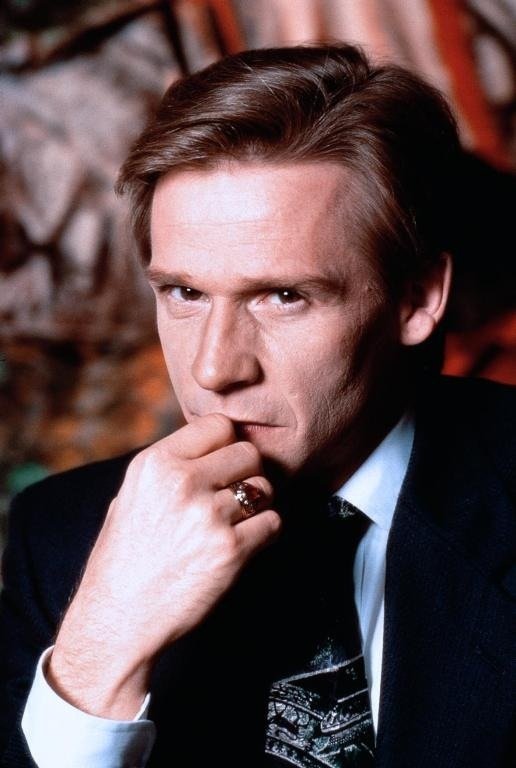 We pulled into Rome. We hadn't even checked into a
pensione or anything. Money was very tight. I went to
Europe indefinitely with about $79.00 in my pocket. Very
adventurous times for me. We were sitting in some cheap place,
having a bowl of – what else? – pasta. I saw this beautiful woman
walk by. Bare feet, in a caftan, sort of a diaphanous robe. It was
this woman I had seen in fashion magazines called Veruschka. I
don't know if you've ever heard of her. She was a very famous
model.
We pulled into Rome. We hadn't even checked into a
pensione or anything. Money was very tight. I went to
Europe indefinitely with about $79.00 in my pocket. Very
adventurous times for me. We were sitting in some cheap place,
having a bowl of – what else? – pasta. I saw this beautiful woman
walk by. Bare feet, in a caftan, sort of a diaphanous robe. It was
this woman I had seen in fashion magazines called Veruschka. I
don't know if you've ever heard of her. She was a very famous
model.
Yes, I remember
her name.
Google her. There was nobody like her that I'd ever
seen in my life, [even] in photographs. Here she was in
person. She walked by. I didn't respond. I was flabbergasted by
her and being in Rome and the whole thing. Then I went, "Excuse
me," and I left [my friend] there. I tried to follow after this woman, not
exactly knowing what I was going to do, maybe just get a better look
at her or something. I left my duffel bag, with all my possessions
in it, behind. I promptly got lost, because all the little streets
in the center of Rome are dead ends and cul de sacs. I
didn't know where I was. Everything started to look alike. I
couldn't find her, I couldn't find where I was.
I turned a corner in a square. And, lo and behold,
they were shooting a movie there. I thought it looked like a really
cheesy situation, personally. I didn't understand what was going
on. There was a big parade and all of these very large, round
prostitutes. There was a giant pig that they were carrying. It was
just madness. The man sitting way up top on a chair on a crane was
Fellini. I had confided in my friend Jeannie – and not very many
other people, it was just a kid's pipe dream – that I thought my
whole life as an actor would come together if I met Fellini.
(laughs) I knew he would recognize me and know what to do with
me immediately. (laughs harder) I don't know why. I think
it was having seen Satyricon at a very young age. It
had blown my mind. I thought, "That's what I want to do! That's
the kind of movie I want to be in." At that point, I didn't even
associate the word art with cinema, that's how young I was.
My friend Jeannie caught up with me, dragging
my duffel bag behind, rather pissed off. I didn't know it was
Fellini, yet. I'm just watching and she goes, "Well, there he is.
There's your big dream guy over there. Fellini. What are you going
to do now?" She was pissed because she had to drag my duffel bag
and I was quite lost. She had been to Rome before, so she kind of
knew the score. I saw that he was there. I was flabbergasted to
see that he was there. There were guards standing around the rope
to so that people couldn't get too close to where they were
shooting. A perimeter was established around the shooting. This
is a long-ass story, Jay, I'm sorry.
That's okay...
I was watching the shooting. Inside, I'm thinking,
"My God, he's right over there. Like 50 feet away from me.
(sighs) I'll never, ever see him again. I'll never get to meet
him. I don't speak Italian. I've been in Rome all of an hour and a
half. I don't have an agent or anything. What would I play?"
Just all these things. When you're staring at your dream 50 feet
away, you actually come up with a lot of reasons why not to get it
together. (laughs) All the negative thoughts went through
my mind. How am I going to do this? What should I do? I'll never
meet him. He's right there. Oh, my God, this is my chance.
So I ducked under the rope. My friend distracted
the guards with her charms. (chuckles) I walked in a
straight line over to where he was. He freaked out completely.
Started screaming. The word you heard most on the set was
"Mauricio," because that was his assistant at the time. Just
screaming and screaming. These guys picked me up and took me to an
alley. There was lots of hub bub in Italian going on. The parade
that was coming down the street had to be backed up, because
apparently I had walked into the middle of it...
Oh no...
... not really knowing what was shooting and what
was not shooting. It seemed to me to be so chaotic, although movie
sets are very controlled, very thought out chaos. I was placed in an alley, in a dead
end, at the end of it. Everybody was talking in Italian – I thought
I was in big trouble. Turning a corner, with all these giant movie
lights behind, I see this back-lit figure in the cape and the hat,
as you've seen so many pictures of him before. I knew it was him.
This silhouette was walking towards me. My knees are shaking. My
voice goes up 15 octaves. It was worse than being in front of the
school principal. He's walking towards me, he can see how I'm
dressed.
His first words are in English, because he sees me
and he recognizes immediately that I'm an American. Not Italian,
not English, not French, but an American. He said, "What was so
important that you had to wreck my movie?" Insert the Fellini
impersonation if you will. I won't even attempt it. And I
(high-pitched voice) replied like this. My voice shaking. I
said, "Mr. Fellini, I had a dream about you!" His face lit up. He
said, "A dream?" I said "Yes." And he just started talking...
So cool...
... and talking and talking and talking and
talking. In English and in Italian. I found out later, that
Roma, which was the picture that I was in... Fellini's Roma,
it was called... was in his mind an assemblage of his youth, his
memories and his fantasies when he was young. It all came to him in
dreams. So, it was a key word. I certainly didn't know that at the
time. He was speaking of stones and colors and clowns and all these
different things. I just listened. What do you do? You're
standing there in front of Fellini. You're scared to death. He's
talking to you. He's actually taking the time to talk to you. In
and out of Italian, weaving this whole spell around me. He said, "I
have something very important to ask you. Are you an actor?" I
said no. I said no. At that point my friend had caught up to me.
Jeannie had come around the corner. She said, "Oh, I'm an
actress!" And she wasn't, at all. He didn't even look at her. He
said to me, "Come here tomorrow at sundown."
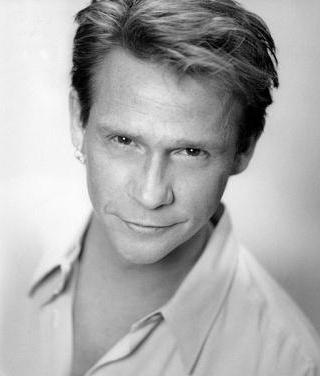 Oh
wow.
Oh
wow.
And, I did. The next day. The ADs and everyone had
been alerted. He had a little area around his director's chair
where they used to put the "dream people," which was what they
called us, although, of course, in Italian. There was a rope around
his chair with a pretty wide perimeter around it. No one was
allowed past the rope, except the dream people. It
was a group of people that had to be there every night of shooting,
because he never knew who was going to surface in his dreams. He'd
shoot all night long. When the sun came up the limousine would
arrive. The window would go down just a crack and you'd see these
two eyes. It was Giulietta Masina, his wife, picking him up every
morning. He'd go home and sleep the day away, dream and write. At
sundown, assemble and start shooting again. I was privileged to be
one of these dream people who had to go there every night, whether
he used us or not.
A few years later
you did Robert Altman's
A Wedding. You've obviously worked with some legendary directors
over your career such as Fellini, Altman, James Bridges, Peter
Yates, right up to Quentin Tarantino.
Joan Micklin Silver. And I'm so glad you mentioned
Jim Bridges, because everybody forgets about Jim Bridges because
he's no longer with us.
How did working
with all these great directors affect you as an actor? How did it
make you a better actor?
Good question. With people that are artists, that
know what they are doing and have high standards, there is an
atmosphere that is created on the set that asks a lot of you.
Working with Bob Altman – I actually made two pictures with Bob, I
had a small part in 3 Women as well – you rise to the
occasion. You step outside of yourself and come up a notch or a
level. It's something that just seeps into you. It's not that it's
always serious. Sometimes the director is tremendously serious,
sometimes they are very light hearted. But there is an atmosphere
that I notice is created with artists that are a little bit more
secure in their talent and that have had a vision. Have had a
certain amount of success, had a certain amount of connection with
the public, with people that have seen their films. I can only
imagine it's like wine, you know? Or a good cheese. The more that
it ages, the more the flavor comes out. The more the talent comes
out. The more it's refined and distilled. If you are open and
available to it, there's no way that doesn't rub off on you. But,
as I say, it's not always a seriousness. Sometimes it is a
seriousness. Sometimes it's looking at art in a different way.
The other good thing about it was a lot of these
people that I worked for, I worked for when I was young. My idea of
film acting was just being formed. In many ways, I thought that was
what all acting that was recorded by a camera was about. Little did
I realize that later, when I started my foray into television, it
was a completely different thing. It was a completely different
thing with directors that were maybe not so experienced. Some
directors completely afraid of their own talent, or afraid of their
own work. I've been on the set with directors that have everything
going for them and then have sabotaged what they had. I don't even
know why. But, I'm sure there's parallels like that in all of our
lives, where we get something and the thing we desire most, we wreck
it.
There's a confidence. In all of these situations
with these directors, they wanted me. They either sought me out or
found me or picked me out of an alley. (laughs) I started
working with Bob Altman because I was visiting my very dear friend
Shelley Duvall when she was doing 3 Women. That's how Bob
put his eye on me and decided that he was going to use me... not
only in that movie, but in A Wedding. It's a lot of those
kind of things.
I felt like with these particular directors that
something in me, and I can't even say what it is, was recognized.
They recognized something and decided that they wanted to use that
or put that in their films. Whether it was a large part or a
supporting part or just a tiny flavor in a film. I work best when
that happens. I'm not anyone who is afraid of competition, because
I love to audition and I love to fight for a role. But in the early
days, things came to me. Oh, and I've got one more answer on what
I learned from working with these great directors. To listen.
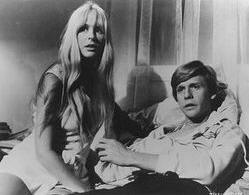 The
first time I remember seeing you, even before
Breaking Away, I believe, was in California Dreaming,
which is still sort of a cult film about the surf culture. Was that
a fun shoot? Was it interesting being a Philly kid hanging out in
the surf world?
The
first time I remember seeing you, even before
Breaking Away, I believe, was in California Dreaming,
which is still sort of a cult film about the surf culture. Was that
a fun shoot? Was it interesting being a Philly kid hanging out in
the surf world?
Yeah. If you remember, it was a real fish out of
water story. He was from Chicago and was tortured by the idea of
his dead brother, who was a trumpet player. He was very, very
young, the kind of age where you're just trying to emulate someone.
You're trying to find someplace in the world, some person you can be
and some place that you can live in once you leave home. My
internal work was he was a kid from a very troubled home. The only
person that ever loved him was his brother, who died unexpectedly.
So, even though it was a fun surfing movie, there was this fish out
of water aspect to it. This troubled young man coming out there and
trying to fit into a whole new society that seemed a little bit more
frivolous, a little bit more sexual, a little bit more fun than he
ever realized before in his life that these things could be.
It was a coming-of-age story, but at least this
character, not as mindless as some coming of age stories are. I've
been blessed in the fact that I've been in a few coming of age films
that I feel have had some substance. From 9/30/55 to
California Dreaming to Breaking Away. I've been able to
play people that were a little more interesting. A little more
troubled. A little more dimensional than just the regular run of
the mill. That's because in many cases, the script was there. It
was in the script. Fade To Black, that was another strange,
twisted coming of age story, so to speak. When I was younger, they
were all about young men who were trying to find their way in the
world. To a certain extent, it mirrored my life experience, as
well.
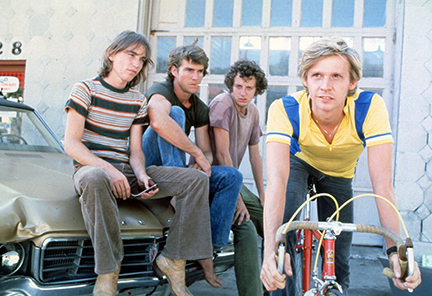 Breaking
Away was meant as a tiny labor of love by director Peter Yates.
Were you shocked by how completely the film was embraced by
audiences when it came out?
Breaking
Away was meant as a tiny labor of love by director Peter Yates.
Were you shocked by how completely the film was embraced by
audiences when it came out?
I think nobody was ready for the way the film would
connect. The film was conceived with quite a few significant
differences than the film turned out. It was originally a script
called Bambino. Dave rode a folding bike. He would
hitchhike with his folding bike. There was a scene where he gets in
a van and is smoking pot with people. His whole being Italian, a
lot of it was mixed in with getting the girl. There were a lot of
different conceptions.
I wasn't really on the same page as the film because
I was working on another movie called... God, it's been re-titled so
many times, I don't even know what the final title was... but one of
the titles was called The Last Word. [ed. note: That
was the release title.] It was Richard Harris, Karen Black,
Penelope Milford, Martin Landau and myself. It was a very troubled
set, a very troubled experience, and it kept being delayed. It
turned out I was not available to do Breaking Away because
this movie was dragging on and on. But Peter had already decided
that it was me. He was lying to the studio. Between Peter Yates
and my agent, they were in cahoots to keep the studio in the dark
about how long I would be tied up on this other film. When I
finally arrived on the set for Breaking Away, there was two
weeks of rehearsal and
shooting that I had missed. They had shot everything they could
possibly shoot in the movie that I wasn't in.
Then they just sort of stuck me in. Their concept
of the character was very, very different than what I had in mind.
I had never been [the leading character]. I mean it turned out that I was the lead in
California Dreaming, but I [became] the lead in the editing
room. It was [filmed as] more of an ensemble piece. When you saw the movie,
they really structured it around this boy's journey. I ended up the
lead. But Breaking Away was clearly the leading role.
I had some thoughts about it, but I was also very
intimidated by the fact that this was a 20th Century Fox movie.
Peter Yates was a very accomplished, very well-known director with
Bullitt and The Deep and these fantastic hits below
his belt. So I didn't speak up as much as I should have. Also, I
flew in on a red-eye special, not sleeping at all, and went right to
the set. I was costumed, made up, my hair done and stuck into a
scene immediately, because the studio wanted to replace me. They
wanted to get the next actor that [Yates] was interested in because
my absence had held up the movie so much. Nothing I could do about
it, but it had. Peter was determined not to lose me.
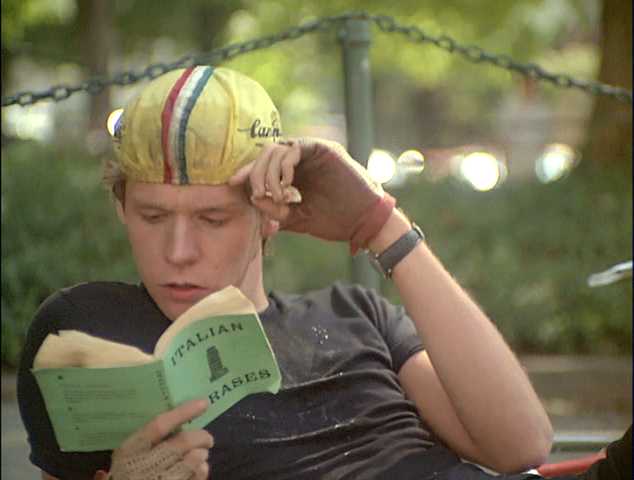 They
stuck me in so that they could get some footage and send it off to
Fox and placate everybody. They painted me brown. They darkened my
skin with makeup. They colored my hair a dark, dark brown and
slicked it back. They had skin tight clothes on. A Banlon shirt
unbuttoned almost down to my navel, with lots of gold chains around
my neck. Pointy high-heeled black boots. Skin tight pants. I
looked like a reject from Saturday Night Fever. That's what
they thought the character was like, so when he comes clean later in
the movie and confesses to the girl that he's not an Italian, he'd
have someplace to go. He would take off those clothes, have his
regular clothes and speak to her regularly. I shot a whole day like
that, absolutely horrified at my appearance. But you're on a movie
set and everyone is saying, "You look great! You look great! Let's
go! We're late! Let's go, let's go!" They're handing you
Polaroids of yourself and you're looking at it and you're going, "Oh
my God."
They
stuck me in so that they could get some footage and send it off to
Fox and placate everybody. They painted me brown. They darkened my
skin with makeup. They colored my hair a dark, dark brown and
slicked it back. They had skin tight clothes on. A Banlon shirt
unbuttoned almost down to my navel, with lots of gold chains around
my neck. Pointy high-heeled black boots. Skin tight pants. I
looked like a reject from Saturday Night Fever. That's what
they thought the character was like, so when he comes clean later in
the movie and confesses to the girl that he's not an Italian, he'd
have someplace to go. He would take off those clothes, have his
regular clothes and speak to her regularly. I shot a whole day like
that, absolutely horrified at my appearance. But you're on a movie
set and everyone is saying, "You look great! You look great! Let's
go! We're late! Let's go, let's go!" They're handing you
Polaroids of yourself and you're looking at it and you're going, "Oh
my God."
That night I didn't sleep again. I called my agent
and said, "I'm lost here. I shouldn't be in this movie. I have no
idea who they think this character is. It's so swarmy that I'm
afraid that we're just on completely different pages." I was a
kid. I was 18 or 19 or something like that. Maybe 20. I remember
trying to speak up for myself and my agent saying, "You can't back
out now. This is a big movie. You've just got to bite the bullet
and do this." The budding artist in me is saying, "No, I don't know
what I'm doing. I don't want to ruin this movie."
The next morning, I got out of the car on the set.
I saw Peter Yates get out of his car. I ran over to him and he ran
over to me. The reserved Englishman gives me a great big hug and I
burst into tears. I looked at him and I said, "Peter, I don't know
what I'm doing. I don't like this boy that you've created. I don't
think that I can play him, before we get in any deeper." I'm
bawling, crying. He sends me back. He says, "You know what you
need? You need to go to sleep. Go back to the hotel and get some
sleep. You haven't slept in a few days. [Screenwriter] Steve
Tesich and I will be over at the hotel room later on to talk with
you."
So I went back. I didn't sleep very well, but I got
a little bit of rest. They came over and talked to me and I told
them where I thought we went wrong, or where it was not right for
me. I didn't know who this character was. We had shot a
whole day's footage like this, with me looking really bad. Like in
a Halloween costume. I looked like a drag king, like a woman
dressed up like a man. (laughs) Which was horrifying. That
old Lily Tomlin character, where she was the taxi driver. I looked
like that. It was just horrible.
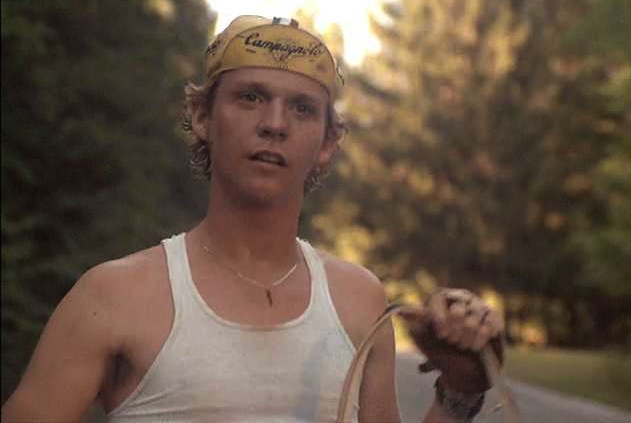 I
said, I want a big family. That's why I want to be Italian. He
doesn't want to be Italian just so he can nail the girl. It's a
whole different feel, what it means to be Italian. What they didn't
realize is that I'm half Italian and I had lived in Italy for over a
year. They listened, to the point where they sent somebody back to Los Angeles to bring
my clothes to the set. All the clothes that you see me [wear] in
the movie that are not bicycle riding outfits, [they] are my clothes.
I
said, I want a big family. That's why I want to be Italian. He
doesn't want to be Italian just so he can nail the girl. It's a
whole different feel, what it means to be Italian. What they didn't
realize is that I'm half Italian and I had lived in Italy for over a
year. They listened, to the point where they sent somebody back to Los Angeles to bring
my clothes to the set. All the clothes that you see me [wear] in
the movie that are not bicycle riding outfits, [they] are my clothes.
We did it differently. I washed the crap out of my
hair so I had my blond hair back again. They said, "How are you
going to change when you finally tell the girl the truth?"
With my whole being I will change. We don't need props to do that.
You don't need costumes to be masquerading yourself. It turned out
really well, I think, those notes. We went back the next day and
started fresh with this brand new character. They really listened
to me, really took my input. I was surprised they would, but they
were very, very open to it. I guess they understood where I was
coming from and liked that a little bit more than where they thought
the character was coming from. I think it very much changed the
movie.
All four of you
Cutters went on to have long careers. Obviously Dennis Quaid has
had a big career, but you, Jackie Earle Haley and Daniel Stern all
have continued working through the years. When you were making the
film, did you get the feeling you were part of a pretty special
cast?
I was star struck by Jackie Earle Haley. The first
thing I had ever seen him was in...
... in
The Bad News
Bears?
No, the first movie I ever saw him in was The Day
of the Locust. Go back and see that. Do you remember that
film?
I do remember it,
but I never saw it.
It's a major movie. [Director] John Schlesinger did
an absolutely brilliant job. Karen Black was unbelievable in the
film. The whole cast was amazing. There's a small part where there
is a very domineering stage mother. She is determined to make her
child into a star. The biggest star at that time [the film takes
place in the 1930s] was Shirley Temple, so she decides to take her
child and make another Shirley Temple, the only problem is that it's
a little boy. She still makes him up like a little girl. It's a
very young Jackie Earle Haley, giving an absolutely fabulous,
complex, layered performance. It's just a flavor in the movie, but
it's absolutely amazing. I saw that and I was like: "Wow! Who the
hell is that kid? Jesus Christ." Then of course The Bad News
Bears. I was hooked. So, when they told me that he was going
to be in the movie, I was star struck. I couldn't wait to meet
him. I was like, now this is a real movie actor. Still a young
person, but he's been in real movies, not just bumming around in
Europe.
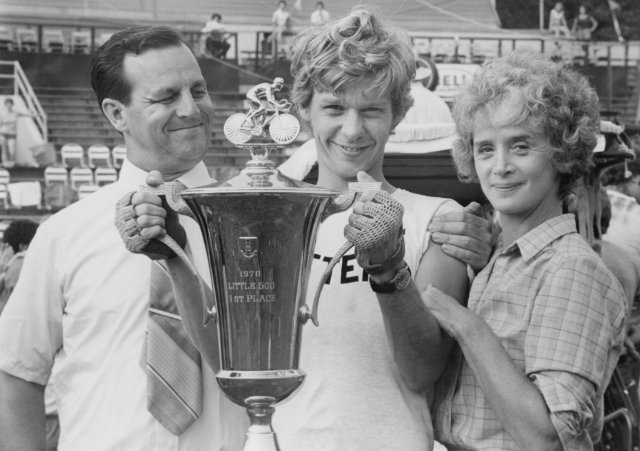 The
other person that I was very impressed with was Barbara Barrie. She
had been nominated for an Academy Award before. She was one of the
greats, I thought.
The
other person that I was very impressed with was Barbara Barrie. She
had been nominated for an Academy Award before. She was one of the
greats, I thought.
Paul Dooley I already knew because we were in A
Wedding together. We played father and son in A Wedding.
They were interested in Charles Durning for the part of the father.
They were trying to schedule a table read of the script. Durning
wasn't available to do the table read. Steve Tesich comes from the
theater. Oftentimes the first day of rehearsal in a play you all
sit around the table and read the script out loud, just so the
director and writer can hear it in the voices of the people that are
actually going to play the role, instead of just hearing the voices
inside their head. They had scheduled this table read and didn't
really sign Charles Durning yet. It was difficult. Was he
available? Was he not? Was the money right? What's going on?
As you said, in those days, it was what would be
considered an independent movie, even though it had 20th Century Fox
executives behind it and Peter was an A-list director. They didn't
know what to do. I said, "You need somebody to read the father? I
just did a movie for Bob Altman with this man who played my father,
Paul Dooley. He's a really terrific New York actor." They said,
"Would he do the reading for us as a favor, knowing that he's not
going to play the part?" I asked, "Will you pay him?" I don't
think anybody had ever said that before. (laughs) We're New
York people. We don't give it away. They said, "Oh, for the
reading? Well, umm... Well, yeah, yeah, I guess we will, but he'll
understand that he's not playing the part, right?" I said, "You say
that to him and he will hear you. He'll get a day's work out of
it." He came in and read it. There was nobody in the room that
wasn't gob smacked by his performance. There was no question of the
fact that he was going to play the father from that moment on. I
don't think they ever even called Charles Durning back.
One of my
favorite scenes in the movie was the scene where you and Paul are
walking on the Indiana campus and he’s telling you about when he cut
the limestone on campus. You and Paul have played father and son a
few times now – he also did it on
Law & Order:
Criminal Intent.
Yeah, and then
[another time] I played a character that thought he was Jesus and he
was a priest. So he was a father again. Our paths keep crossing,
very happily.
Do you almost
think of him as something of a second dad now?
It's funny, yeah,
you could almost say that. He had a relationship with his father
very much like Dave, the character in Breaking Away, had with
his dad. We both connected on that level – growing up with a father
that was possibly a little bit more abusive than the father in the
movie. He was just verbally putting down his son. I think we both
grew up in households where you never spoke unless spoken to and if
you were any kind of an individual, you got squashed down
immediately. So he had a lot to draw on and so did I. We knew that
we had that connection with each other. I think we played it for
all it was worth.
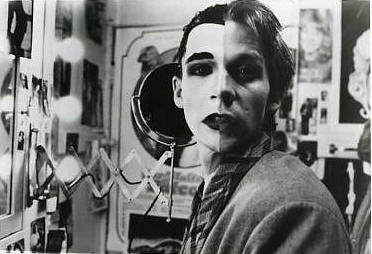 Right
after
Breaking Away it looked like you could do anything and you took
on a totally different kind of role in Fade to Black. I
remember really liking the movie at the time though I haven't seen
it in years. Was the fact that the role was so different for you
what attracted you to it?
Right
after
Breaking Away it looked like you could do anything and you took
on a totally different kind of role in Fade to Black. I
remember really liking the movie at the time though I haven't seen
it in years. Was the fact that the role was so different for you
what attracted you to it?
There's also another truth to the matter. Right
after Breaking Away opened to much fanfare, I was living in
New York and I broke my leg in several different places in a skiing
accident. I was really messed up for a while. I was in some sort
of cast for close to two years. I had a cast under my costume in
Fade to Black. They came to me with an offer. I read the
script. I was intrigued by the character, but I thought the script
itself was rather flawed. I said no. They came back again and
raised the money. I said no. And they came back again and they
raised the money and I said no. My agent said, "Now, wait a
second. They are talking serious dough here and they want to put
your name above the title. You need to make that jump from
Breaking Away to this." I was still recuperating from this
terrible skiing accident that I'd been in. The whole time I wasn't
really concerned about the money. Me saying no was because I felt
that the script was not fully realized.
[But] I couldn't get this character out of my mind.
Then I realized I would never get a chance to play this kind of
character again, this guy that recreates all these screen legends
and iconic movie scenes in his own life. I just wanted it to be
done with some class and intelligence. Not be just a regular slasher movie. I wasn't really interested in doing a horror movie
after Breaking Away. I had done my horror movies before
Breaking Away. I met with the director/writer Vernon
Zimmerman. I said, "These are the greatest scenes in this movie,
with the worst possible dialogue in the world. How could you create
these fantastic scenes and have it written so poorly?" It was a combination of great writing and not good writing.
"Did you have to rewrite this script a million times by committee?
How long have you been shopping this around?" He said, "Quite a
while, and yeah, I've had to take notes from everybody that ever
wanted to put money in the movie."
Therefore, what resulted was a real disjointed
script with a lot of other people's input, even though Vernon's
original instincts and his original ideas were really great. I said
"if you want to work collaboratively on this particular project,
I'll look at it again and we should seriously talk, with pencil to
paper in front of ourselves." We got on like a house on fire and
agreed on so many things. It turned out that I really liked
what he
originally
wanted
to do with the script. At that point, it
was just a fight to keep it something that was more of a
psychological thriller than a slasher movie. [The character] having
justifications, albeit mentally impaired justifications, why
he got involved in all this violence. I wanted to show what was
underneath. This was a human being caught inside of this illness,
rather than just, "Oh, it's Tuesday, I think I'll become a slasher."
Become a murderer for no apparent reason, like Chucky and Friday
the 13th and stuff. We only got to [those characters'] back
stories with many of the subsequent sequels.
I thought Eric Binford could be a legendary one of
those anti-heroes. Then I met Linda Kerridge,
who plays Marilyn O'Connor in the movie and I couldn't resist. She
was just such a lovely actress and just a great, great girl. I
really wanted to work with her. It did everything that needed to be
done for my career on the business side of it at that point. It
seemed like a good bet. The fact that it was more warmly received
in Europe than it was here was a shame. I also loved our producer.
We had Irwin Yablans as our producer. He was a great guy. I loved
working with him.
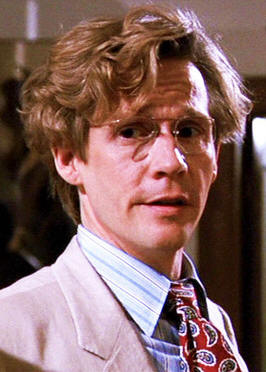 Speaking
of horror, you were in one of my favorite miniseries ever, for
Stephen King’s It.
Speaking
of horror, you were in one of my favorite miniseries ever, for
Stephen King’s It.
Oh, I thought
you were going to say The Lost Room. But that was more
sci-fi, I guess.
Have you been
able to look at a clown in the same way since?
(laughs)
Yes, but only because the man underneath it was Tim Curry. He's the
sweetest person in the world. If he can somehow can make us accept
monstrous transsexuals (laughs again) in Rocky Horror,
of course he made us love this murderous clown that he was.
It
had a pretty strong TV cast as well, and other than you and Richard
Thomas, a lot of them came out of the comedy world. What was it
like to work with all of them?
Well, the fact of the matter is that John
Ritter was an absolutely great actor. He just was. If there is
anybody that doubts that he was more than a brilliant comedian, have
them look at Sling Blade. Have them look at some of the
independent films that he did later on in his career. He was just
an all-around fantastic actor. We only thought comedy when we
looked at him because he was so brilliant in a not-very-brilliant
series. In my mind, actor to actor, John had all the goods. He was
as great as any actor that I ever worked with and I got to work with
some really great ones.
Harry Anderson, he loves movies so much. He's also
a wonderful writer. Very, very serious about that. Then you've got
Annette O'Toole, who was one of the great leading ladies of her
particular period. The most beautiful girl that you ever saw in
your life. So it wasn't as dominated by comics as you'd think, just
because of Harry and John. Everybody else was pretty much not known
for their comedy.
Well Tim did a
couple of sitcoms.
Oh, but that was later.
Well, no, Tim
Reid had done
WKRP in
Cincinnati and Sister Sister...
Tim Reid? Oh, I thought you meant Tim Curry.
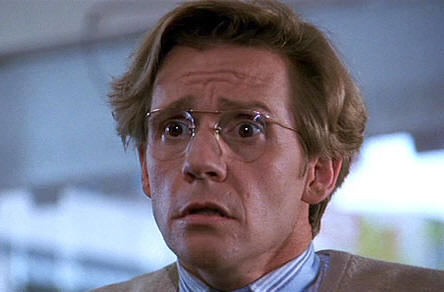 Oh,
no, I'm sorry, Tim Reid.
Oh,
no, I'm sorry, Tim Reid.
Yeah. Well, Tim Reid is also a very serious chap,
because he's a producer. He was a very successful producer in
Hollywood. But I know what you mean about the comedic actors.
There have been these trends that Hollywood goes through. Sometimes
it's because the script is weak – which wasn't the case with It.
They will hire a standup comedian, somebody who is well-versed in
improvisation because they need the holes to be plugged of their
script. They know that anybody that has experience doing improv or
stand-up will be able to plug the holes of a faulty script. I think
the studios have gone through that period.
Still, to a large extent that's what we see on
sitcoms. Every night when I'm cooking dinner, I watch Roseanne
on Hulu. It's amazing the amount of serious, brilliant
actors that show and that woman employed over the run of that
sitcom. From John Goodman to Laurie Metcalfe to Estelle Parsons,
you name it. There were more Academy nominated people in that
sitcom, I think, than in any of them. They didn't go that route.
They had their standup comedian. They had Roseanne. Then, as she
always said, she wanted to become a film actress, so they hired film
actors to surround her. Nowadays you hire a standup and that's what
you do. Build a character around the standup comedian. I think the
money people feel a little bit more comfortable when people have
comedy chops, because it's always good to have laughs in it, whether
it's a serious piece or not.
How did you learn
that Quentin Tarantino wanted you to work on
Django
Unchained?
I got the script. He sent the script to my agent.
When I pulled it out of the envelope, I practically fainted.
Written across the title page in his handwriting is "Django
Unchained written and directed by Quentin Tarantino" scrawled
across the front of it. It looked like a book report. I went oh my
God! I read it and called my agent back and said "I'm clearly too
old to be playing this character." He said in the script that
Leonide Moguy and Calvin Candie, who is played by Leonardo DiCaprio,
are the same age. We're supposed to have grown up together.
Does Quentin forget that it's been almost 35 years
since Breaking Away? (laughs) We did that back in 1979. I
have not stayed the same. I've not been sleeping in a hyperbolic
chamber. (laughs again) I'm steroid free. It's just me and
I've aged. I'm not Leo DiCaprio's age anymore. I got a message
back saying don't worry, he's rewritten with me in mind.
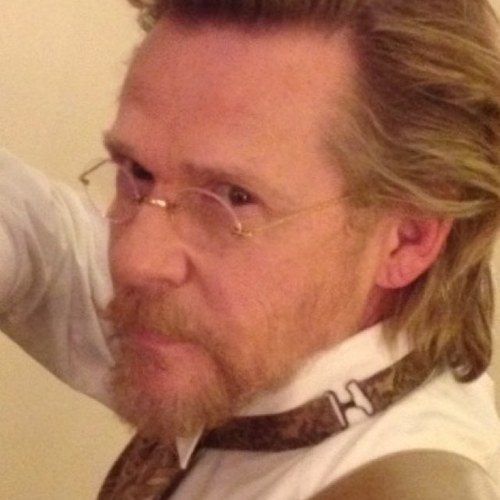 How
gratifying is that for you as an actor?
How
gratifying is that for you as an actor?
It was pretty gratifying. I went in to meet him,
not knowing what to expect. We spoke for three hours nonstop. I
was not intimidated by his genius, but that's to his credit.
Usually when I meet somebody like that I can be thrown into
respectful silence and just listen. Drink in everything I can. But
Quentin is incredibly engaging. He likes a two-way conversation. I
knew this was my audition of sorts, speaking with him, so I jumped
in with both feet.
I had done a hell of a lot of research on the south
at the time. Also, the character. One of the secrets to Quentin is
that he names everything in his movie, even the horses that people
ride. Everything is named. Even if it's just a name that is
referenced, a character that never appears, it means something to
Quentin. Every frame that goes through that camera means something
to Quentin. He doesn't waste a frame of it, whether you get it or
not. It not only serves the purpose of the script that he wrote,
but there is also usually an homage in there as well. From
some of the more obvious things that people point out to some
obscure things that you'll just never know. Right down to the names
on the wanted posters hanging up on the wall. Each one of those is
hand-done by Quentin, thought out, planned.
The first thing I did was Google my character's name
and found out that he was a Russian filmmaker that had made three
pictures in America and had discovered Ava Gardner. I was able to
say, "Leonide Moguy, eh? You liked him, huh?" I rented and watched
his movies and we were able to discuss that. He was pretty
impressed that I went that far. I even went deeper into the Google
on Leonide Moguy and found out stuff that Quentin didn't know. It
was a very stimulating afternoon. If I had never gotten the part, I
would still rank it as one of the high points of being involved in
film.
He started out the conversation by saying, "I have
seen every movie you've ever made the week that it opened." I was
like: What? Who does that? My family doesn't. My agent doesn't.
Sometimes I don't even do that. I guess he likes me. He said, "Oh,
yeah, you've been on my radar for quite a while now." I just
thought, fuck! It's every actor's dream to know that someone is
watching.
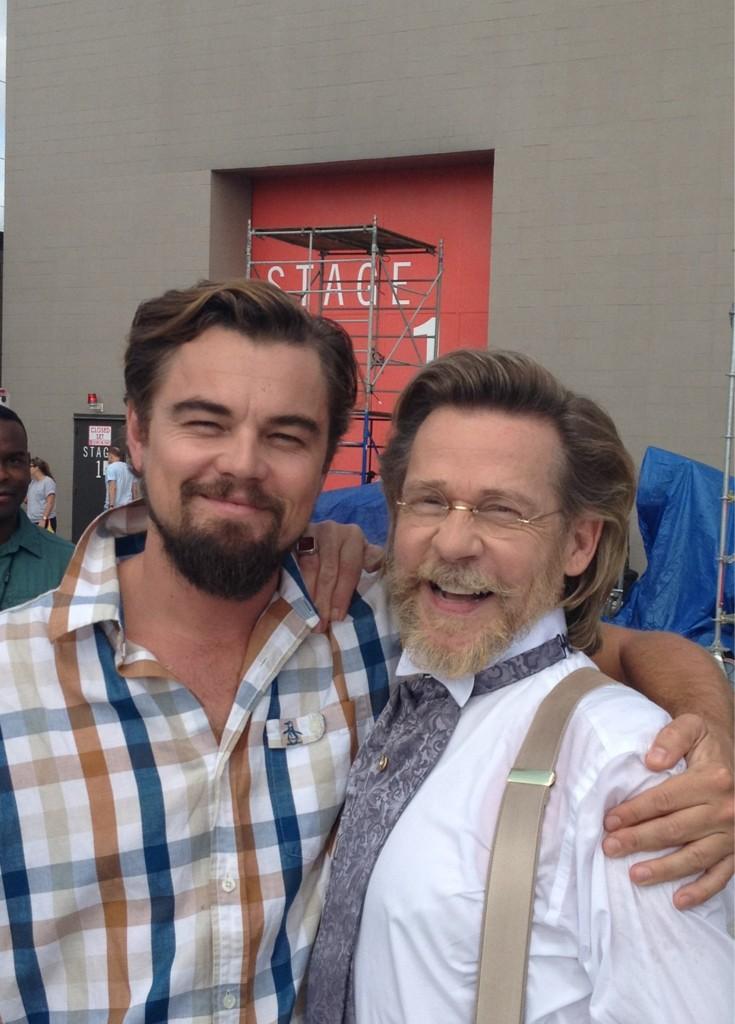 How
weird was it to be suddenly doing scenes with all this A-level
Hollywood talent like Leonardo DiCaprio, Jamie Foxx, Samuel L.
Jackson and Christoph Waltz?
How
weird was it to be suddenly doing scenes with all this A-level
Hollywood talent like Leonardo DiCaprio, Jamie Foxx, Samuel L.
Jackson and Christoph Waltz?
It was great. It was a level of professionalism,
also a level of respect. There was also a great deal of fun when we
weren't shooting. Everybody knew they were doing something
special. Quentin is quite a fantastic ringleader. He is a real
maestro the way he works on the set. He laughs all the time,
but he's also incredibly focused. He gets what he wants and then
some. The only regret that I have is that the movie is not even
longer, because the first cut came in at five hours. That's the
script that he wrote, that version. I could use more of it.
Lonesome Dove was five hours, but it was a miniseries. Even
though Harvey [Weinstein, the executive producer] was talking about
splitting Django in two, Quentin was pretty adamant about the
fact that the journey that Django was on had to be completed in one
film. You couldn't wait six months until the plantation part of the
movie came out. You had to see the entire journey of this character
from tortured slave to this superman by the end of the movie. It
had to be achieved in one sitting. There is a lot of the picture
that is not in there. A lot of the supporting cast, our stuff fell
by the wayside to concentrate on the main stories. It's not that
they're not written and were not filmed, because they were written
beautifully and they were filmed amazingly. We can all hope that
someday...
Maybe the
director's cut will come out.
That would be absolutely amazing to be able to see
the script that he wrote in its entirety. He took great care with
every second of this film and covered it absolutely beautifully.
It's a rare experience to be able to work with a genius who is not
compromised whatsoever. Because of the success of his movies and
his own ability of writing such amazing things, his friend Harvey
Weinstein gave him all the freedom that he needed. Compromise is a
big word in Hollywood. Quentin didn't have to on any aspect of
Django Unchained. For an actor to be working with someone like
that is a very rare, very special experience. I'll forever be
grateful to him for hiring me. And I'm forever grateful to the
universe for giving me this opportunity.
Do you have any
Oscar parties planned in which you will be rooting for
Django?
Oh, yes. All sorts of stuff going on. I'll let you
know after it happens. It's the frosting on the cake, but it's a
particularly delicious frosting, I must say.
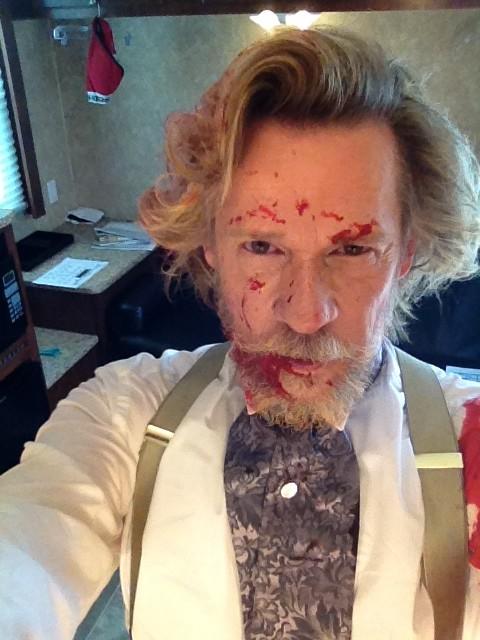 What
do you have coming next?
What
do you have coming next?
There is a script that I just finished reading the
other day. I don't really like to talk about things in the future.
I understand.
They're not set. I've never given up my theater
interest. You were talking about what's it like working with these
huge stars. I spent a year on stage with Elizabeth Taylor in
Little Foxes. Some of the people I worked with under Robert
Altman's auspices were great. I worked with the mother of cinema,
Lillian Gish. It may be one of the reasons why [Tarantino] chose
me. I don't know. But as far as being shy or intimidated by the
incredible talent that I was able sit around the table with, it felt
right, you know what I mean? We were all up for the challenge and
all up for the task. The scene in the dining room, we were in there
for at least two weeks.
That must have
been pretty chaotic to film.
It wasn't chaotic. It was intense. Because Bob
Richardson, our DP, is another genius. And the fact that we're
working on film. We're not working digital and we're only doing one
camera at a time. I don't know if you know this about Quentin, it
has to be happening or he doesn't film it. There is no CGI
[computer generated effects] in this movie. Do you know there's not
one ADR [dubbed] line in this movie?
I didn't know
that.
That's the genius of our sound guy, Mark Ulano, who
was nominated for sound by BAFTA. That's how highly they think of
him. He does all of Quentin's movies. I kept waiting, when are we
going in to the room to do some ADR? Next thing I know, they say,
"You're invited to the screening." I go, "I haven't done any ADR."
I go to the screening and the sound was perfect. Quentin doesn't
like ADR. He doesn't like CGI. It has to be happening.
When you get shot in a Tarantino movie, you're kind
of getting shot. (laughs) It's nothing that he puts in
later. He wants it to be happening in front of him and then he
films it. It all has to look real. It all has to be happening.
The little cards that had our names on them that he would give
people, that has to be the real signature. The slave papers when
the transaction was going down, where Calvin Candie was selling
Broomhilda [Kerry Washington], those papers, they are all written
out by the characters involved. Quentin is a stickler for that.
(chuckles) It's kind of amazing.
You know what the secret is? If he wasn't so in
love with film, he'd be a fantastic theater director. He would yell
"Action" and we'd go to a scene from top to bottom and never stop.
We did it every time, for every person, for every close up. Not
only the master, but for the coverage, too. I don't know if he
realizes it or not, but he'd be a fantastic theater director.
CLICK HERE TO SEE WHAT
CO-STAR CHRISTOPH WALTZ HAD TO SAY ABOUT DJANGO UNCHAINED!
Email
us Let us know what you
think.